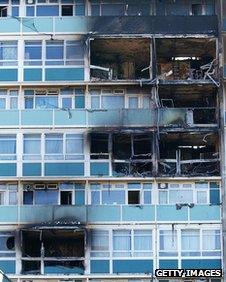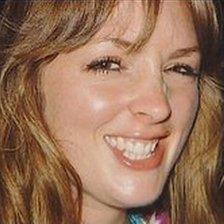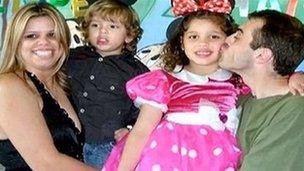Lakanal House fire: The questions yet to be answered
- Published

Three adults and three children died in the fire in 2009
The inquest into the deaths of six people in a tower block fire in south-east London has entered its fifth week with another four weeks to go. Kurt Barling outlines the evidence given so far.
The inquest into the deaths at the Lakanal House high rise block, in Camberwell, in 2009 has been long awaited by the families of Dayana Francisquini, Thais Francisquini, Felipe Francisquini-Cervi, Helen and Michelle Udoaka and Catherine Hickman.
Questions about how it started have already been answered.
A fault in a television set caused the fire which quickly developed into an inferno.
The central questions for the inquest at Lambeth Town Hall to address will be to find out why six residents perished in flats away from the original seat of the fire in flat 65 and how did it spread so widely.
Fire fighters expect fires to be contained within individual apartments for 60 minutes so, why did "compartmentalisation" not work on this occasion?
Phoning loved ones
Another important set of questions emerge from the fact the fire broke out of the initial flat and spread so far and so fast it took the emergency services by surprise.
Why did fire fighters not reach the trapped people quickly enough?
Importantly, what lessons need to be learned by public authorities and emergency services so one of the worst fires in living memory is not repeated with such a tragic loss of life?
So far, the court has heard from the relatives of those who died, residents who were rescued and dozens of fire fighters.
In the first week jurors heard how relatives talked to their loved ones on mobile phones and tried to reassure them they would be rescued.
Rafael Cervi, whose wife and two children died, told the inquest he rushed back from work after being called by his wife to say fire had broken out in the block.

Catherine Hickman was also killed in the blaze
He said: "When I arrived at Lakanal I felt useless to be honest. It was hard to see what was happening….Everything I built and dreamed of was lost in three hours."
The families repeatedly made dignified interventions through their lawyers to reassure individual fire fighters and the resident, in whose flat the fire started, that they should not feel personally responsible.
Much of the evidence so far has focussed on the efforts of fire fighters.
The initial 999 call was responded to within minutes and fire crews were at Lakanal and ready to deploy from the local Peckham fire station quickly.
Poor radio communication
It became clear tackling the fire was hampered by a lack of knowledge of the 14-storey block.
In evidence, fire fighters repeatedly stressed they were not aware of the safe routes in and out of the block.
The first crews could only go in with breathing apparatus and discovered quickly the entire front part of the flat in which the fire originated had burned away in the intense heat.
Senior incident commander Watch Manager John Howling described being "overwhelmed with the volume of information" he was receiving as more crews arrived and waited to be deployed.
Some of fire fighters said radio communications were mostly intermittent and poor.
By the time search and rescue teams were deployed conditions had deteriorated and fire fighters were tackling a blaze across more than four floors.
The first crews to reach the trapped families in flat 81 are still clearly traumatised by their experiences.

Rafael Cervi said he "felt useless" that he could not do more to help his family
They described having to initially fight a raging fire rather than rescue people which is why they are usually deployed.
One fire fighter said he was so traumatised by finding baby Michelle Udoaka he was diagnosed with post-traumatic stress and signed off for seven months.
Despite knowing people were trapped in flats 79 and 81, poor knowledge of the layout of the block hindered the rescue effort.
Fire fighters described getting lost and not realising what floor they needed to get to in the complex layout.
One family was rescued from the 12th floor as they ignored 999 operator advice to stay put and made their way on to the escape balcony where they were rescued by the first fire fighters.
Tragically these crews were just metres from the trapped families in flat 81 but ran too low on air and had to withdraw to secure the safety of the first family.
Poor communications meant no other fire crews were told how they had arrived at flat 81 and so no one else located the five trapped people before they had succumbed to the effects of the fire.
The jury has heard many tales of hardship and heartbreak but it is yet to hear from Southwark Council and the contractors who refurbished the block.
- Published7 February 2013
- Published29 January 2013
- Published16 January 2013
- Published15 January 2013
- Published14 January 2013